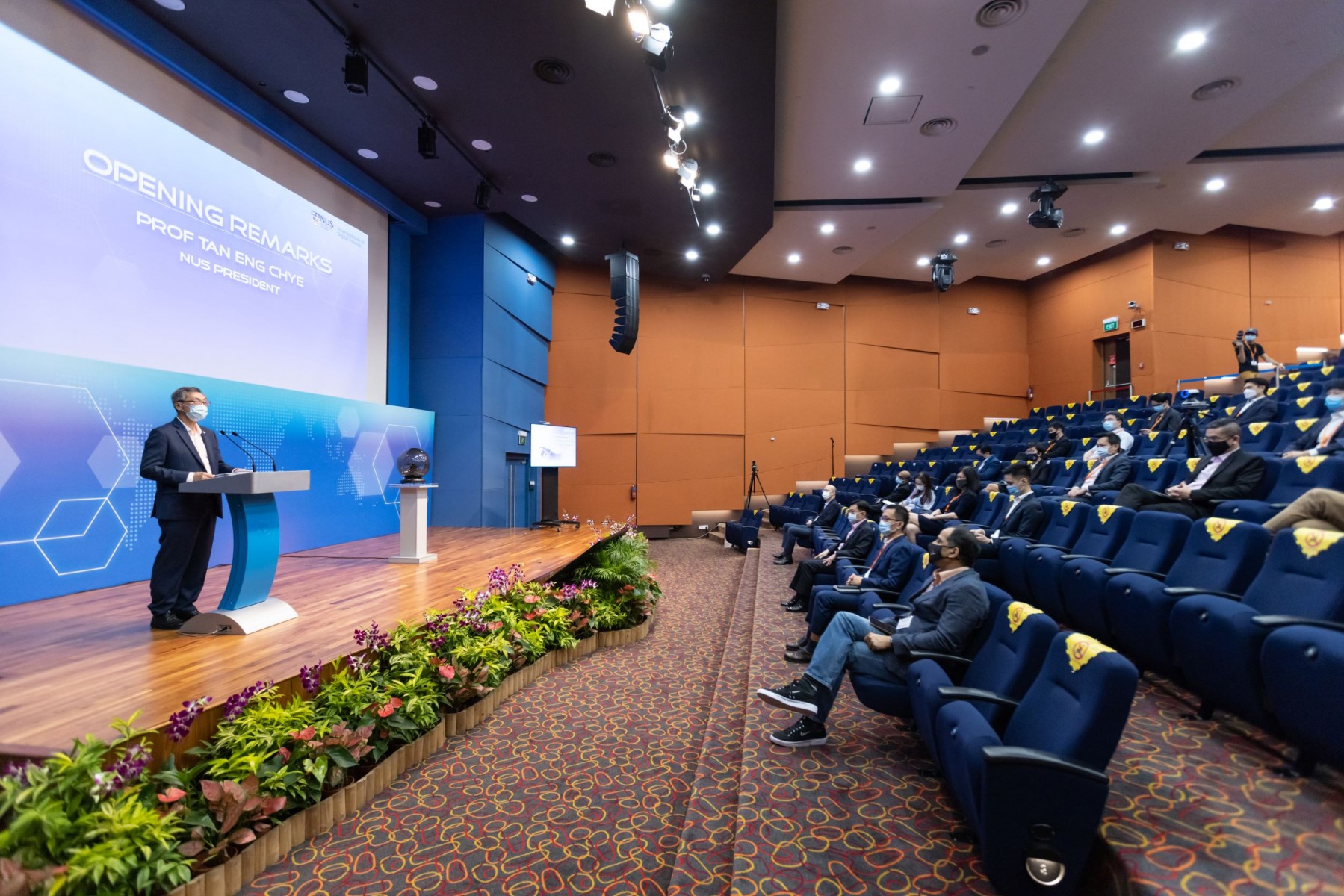Asian FinTech capabilities get a boost

The Asian Institute of Digital Finance (AIDF) was officially launched by Mr Heng Swee Keat, Deputy Prime Minister and Coordinating Minister for Economic Policies, on 3 September 2021. Jointly set up by NUS, the Monetary Authority of Singapore (MAS), and the National Research Foundation (NRF), this university-level research institute will take advantage of the transformational capabilities afforded by financial technology (FinTech) to advance digital finance in Singapore and the region.
AIDF aspires to be a thought leader, a FinTech knowledge hub, and an experimental site for developing digital financial technologies as well as for nurturing current and future FinTech researchers and practitioners in Asia.
Speaking at the launch ceremony, Mr Heng highlighted that there is great potential to develop Singapore’s FinTech ecosystem, especially with the digital economy in Southeast Asia projecting to triple to US$300 billion by 2025.
“As a key node in the region, there is much more Singapore can do to improve the lives of people and enhance the vibrancy of economies in the region. This is why we announced the setting up of the Asian Institute of Digital Finance at SFF X SWITCH last year,” he said.
The launch was held ahead of AIDF’s digital finance symposium, which featured speakers from the industry, academia and the government who discussed the digital transformation of the financial landscape in Asia.
AIDF’s three-pronged mission
Delivering the opening remarks, Prof Tan shared that AIDF’s mission focuses on three pillars: education, research and business incubation.
AIDF’s first pillar – education – will contribute to Singapore’s journey of becoming a digital society by nurturing and developing a strong pipeline of FinTech industry leaders for Asia through high-quality and market-relevant programmes.
Through these learning opportunities, students and industry professionals will acquire deep, technical FinTech knowledge and solutions and will also be encouraged to translate their skills and knowledge into real-world products and services.
Prof Tan highlighted that AIDF’s flagship programme – the Master’s in Digital Finance Technology – has been well-received with an inaugural cohort of 51 students. Another five students have also been accepted into AIDF’s PhD programme in Digital Financial Technology, Singapore’s first doctoral programme in FinTech, which trains top graduates who can excel with a strong technical foundation and independent research ability.
The second pillar – research – is aligned with strategic priorities in Singapore and the region.
A steering group comprising thought leaders from academic, government and the financial and technology industries has been formed to guide AIDF’s research directions, Prof Tan said.
“As a hub for the FinTech research community in Asia, AIDF will partner with other NUS research institutes and centres that work in adjacent disciplines and technologies which are critical to enabling, enhancing, and extending the impact of FinTech applications. Beyond NUS, AIDF will also pursue mutually beneficial research collaborations with other academic institutions and industry organisations,” Prof Tan added.
The third pillar of business incubation is meant to translate ideas from classroom to market. To achieve this, AIDF has launched Fincubator – its entrepreneurship arm – to grow and develop prospective business ideas.
Fincubator taps on the NUS Graduate Research and Innovation Programme, or GRIP, which is a structured programme that brings project teams through the start-up process, involving product and market validation, cost and business analyses, to IP and growth strategies.
Being part of the growing FinTech revolution
In his keynote speech, Mr Heng, who is also chairman of the NRF, said that AIDF has partnered the finance industry to develop a federated learning initiative to address the age-old challenge of financial institutions being reluctant to share microdata with each other due to commercial and competition reasons.
The result of the collaboration is the SME Credit Analytics Consortium, which employs machine learning to optimise algorithms using datasets gleaned from multiple institutions without the microdata actually leaving each financial institution. Through this Consortium, financial institutions can learn from the collective experience to develop better assessment models, particularly for defaults and debt recovery, resulting in more optimised credit assessments.
Tackling current global challenges like climate change is also a key thrust for AIDF. To emerge stronger from the current COVID-19 crisis and be sustainable, Mr Heng also shared that AIDF is contributing to green finance via a Green FinTech collaboration, which seeks to develop evidence-based approaches to measure green initiatives in agricultural supply chains, allowing banks to extend loans to firms which are truly adopting green and sustainable practices.
Off to a strong start
Technology is changing and defining the world, and the tremendous potential of FinTech likewise paves the way for new and innovative services and solutions, said Prof Tan.
“In this modern era of AI and data-driven decisions, FinTech will continue to drive the transformation of the financial services industry in Singapore,” added Prof Tan. “I hope that AIDF will grow to become a hub for FinTech professionals to upgrade and upskill, a node connecting FinTech professionals from across the region, and a spoke from which valuable ideas and networks are forged.”





